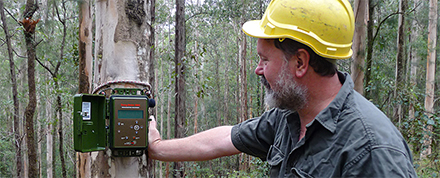 Independent economic modelling of the impact of the so-called Great Koala National Park on the NSW North Coast has found it would lead to a $757 million-a-year hit to the NSW economy and cut almost 2000 jobs, according to the Australian Forest Products Association. AFPA CEO Mr Ross Hampton said the park would be devastating for communities across the region where the timber industry is a major employer. Source: Timberbiz
Independent economic modelling of the impact of the so-called Great Koala National Park on the NSW North Coast has found it would lead to a $757 million-a-year hit to the NSW economy and cut almost 2000 jobs, according to the Australian Forest Products Association. AFPA CEO Mr Ross Hampton said the park would be devastating for communities across the region where the timber industry is a major employer. Source: Timberbiz
“This conservative estimate by respected economic modeller Ernst & Young would amount to billions of dollars and thousands more down-stream jobs over the 15 years than the National Parks Association-sponsored report considered,” he said.
“The flawed report published by the National Parks Association fails to recognise their plan would mean the closure of the native forestry industry on the North Coast and with it, thousands of jobs and billions of dollars in economic activity in our regions.”
Mr Hampton said forest industries were the biggest employer on the North Coast.
Shutting down a sustainable, renewable industry would be disastrous for these communities and the NSW economy, and would deliver no environmental benefits.
Mr Hampton said the NPA’s campaign ignored the scientific evidence shows that timber harvesting in NSW has no impact on koala occupancy in the forest.
“Only 0.2% of NSW native forests are harvested annually for timber production and they are all regenerated by law,” he said.
The latest research from the NSW Department of Primary Industries’ koala expert Dr Brad Law, who has surveyed millions of hectares of NSW koala habitat using breakthrough ‘sound monitoring’ techniques, had found that past timber harvesting did not influence koala occupancy.
He had found that there was no difference in results between heavily harvested, lightly harvested and old growth sites. Time since harvesting and the amount of harvesting in the local area did not influence occupancy. There was also no difference between National Park and State forest sites.*
Mr Hampton said Australians loved the quality hardwood timbers produced by the North Coast timber industry and closing it down would only lead to more imports from questionable sources.
“Closing down Australia’s sustainably managed native timber industry won’t stop the demand for quality appearance-grade hardwood timber for floorboards, staircases and furniture. It will just increase imports from countries with weaker regulations, including those where rainforests are logged unsustainably and illegally,” he said.
* https://www.dpi.nsw.gov.au/about-us/media-centre/releases/2018/acoustics-provide-new-insights-on-koalas-in-hinterland-forests







